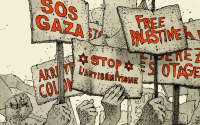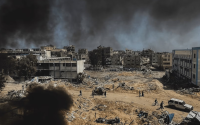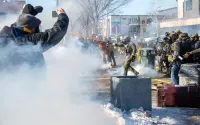 |
She is working for the United Nations children's agency, Unicef, in Nyala, southern Darfur and is writing a diary for BBC News Online about her experiences.
0807:
In the early morning I try to establish contact with a radio station in The Netherlands for a live interview.
The mobile phone network was problematic again so I used the satellite phone. Usually I manage to get it working in a couple of minutes - I go to the street, point south and hold it at 45 degrees and then it should work. Nope - not this morning.
 Life is improving in the camps, but poor sanitation remains a problem |
Darfur is becoming a real "hot spot" for high-level visitors. In the last couple of weeks the people in Darfur have seen many convoys of white UN vehicles speeding through town on their way to the internal displaced peoples (IDP) camps. Kofi Annan, Colin Powell, Carol Bellamy - the executive director of Unicef - and many others have visited Darfur.
Today was another important day for the Darfur region. This morning I was at the airport with my UN colleagues to welcome Dr Lee Jong-Wook, director general of the World Health Organisation (WHO).
Unicef and WHO work closely together in providing health care services to displaced people, the host communities and other people affected by the war. In the month of June, for example, Unicef, WHO and the Sudanese ministry of health organised a massive measles campaign, which eventually reached some 2m children up to the age of 15. This is amazing keeping in mind that many areas of Darfur were insecure.
1800:
During the evening meeting, which lasted about two hours, we had a look at the Cholera Emergency Preparedness and Response Plan for Darfur.
 Residents at Kalma camp receive food and medical aid |
These factors contribute to the potential increase in diarrhoeal diseases, particularly cholera. I hope that I can ditch this emergency plan as soon as possible - I just don't want to think about the implications of an outbreak.






